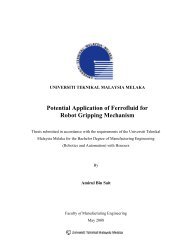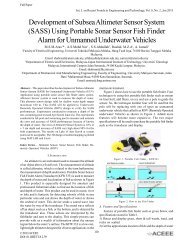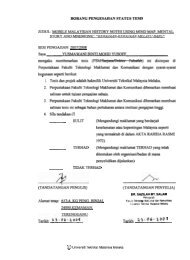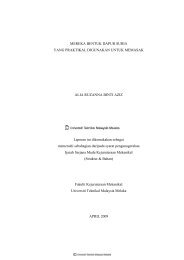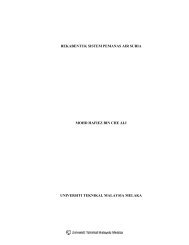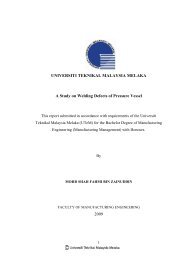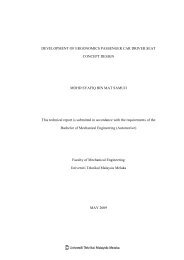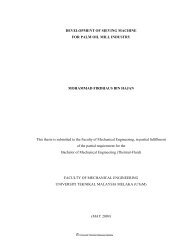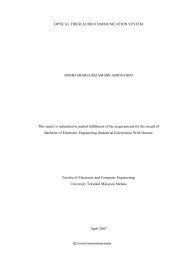Brand, Identity and Reputation: Exploring, Creating New Realities ...
Brand, Identity and Reputation: Exploring, Creating New Realities ...
Brand, Identity and Reputation: Exploring, Creating New Realities ...
You also want an ePaper? Increase the reach of your titles
YUMPU automatically turns print PDFs into web optimized ePapers that Google loves.
Organizational Factors Contributing to Successful Delivery of Corporate <strong>Br<strong>and</strong></strong> Experience: What Do We<br />
Know?<br />
Extended Abstract<br />
Clive Helm, Westminster Business School, University of Westminster, U.K.<br />
Introduction, context <strong>and</strong> purpose<br />
In recent years, the related notions of value co-creation (Prahald <strong>and</strong> Ramaswamy, 2000, 2004; Wikstrom, 1996),<br />
Service-Dominant Logic (Vargo <strong>and</strong> Lusch, 2004, 2008) <strong>and</strong> an experientially-based economy (Pine <strong>and</strong> Gilmore,<br />
1988, 1989) have emerged to create a context in which the source of value for firm, consumers <strong>and</strong> other stakeholders is<br />
seen to lie in the interaction between those consumers <strong>and</strong> the firm's br<strong>and</strong> that results in a distinctive <strong>and</strong> meaningful<br />
experience for them. Consumers are no longer viewed as passive recipients of products but, along with the br<strong>and</strong> owner,<br />
active participants in the process of co-creating a uniquely valuable, br<strong>and</strong>ed experience. As Gronroos (2007) puts it,<br />
'customers do not look for goods or services, ...but for solutions that serve their own value generating processes', <strong>and</strong><br />
rather than simply selling increasingly commoditized goods or services, firms now increasingly seek to derive superior<br />
value from delivering <strong>and</strong> enabling such an experience.<br />
From the co-creation st<strong>and</strong>point therefore, a firm's competitive advantage <strong>and</strong> ability to create long term value come not<br />
only from ownership of a br<strong>and</strong> asset that promises a distinctive <strong>and</strong> meaningful experience, but also from having the<br />
capability to successfully deliver it to meet the expectations of consumers <strong>and</strong> other stakeholders, so as to engage <strong>and</strong><br />
build long-term relationships with them (Norton, 2003; Roper <strong>and</strong> Davies, 2007; Schreuer, 2000).<br />
The co-creation view has therefore highlighted the importance to a firm's value creation process of its capability in<br />
'br<strong>and</strong> delivery' - what Aaker (2004) describes as the ability to 'deliver the br<strong>and</strong> promise with reliability'; in other<br />
words, the capability to successfully <strong>and</strong> consistently deliver the experience the br<strong>and</strong> represents <strong>and</strong> promises in terms<br />
of a distinctive set of functional <strong>and</strong> emotional benefits. Growing awareness of the importance of br<strong>and</strong> delivery was<br />
neatly articulated some years ago in the now familiar <strong>and</strong> much quoted statement by Jan Carlzon, former Chief<br />
Executive of Sc<strong>and</strong>inavian Airlines Service;<br />
'SAS is not a collection of material assets but the quality of contact between an individual customer <strong>and</strong> SAS employees<br />
who serve a customer directly. Last year, each of our ten million customers came into contact with approximately five<br />
SAS employees <strong>and</strong> this contact lasted an average of 15 seconds each time. These 50 million 'moments of truth' are the<br />
moments that ultimately determine whether SAS will succeed or fail as a company. We must prove to customers that<br />
SAS is their best alternative' (Carlzon, 1988).<br />
In reality, there is a realization that successful <strong>and</strong> consistent delivery of the experience promised by the br<strong>and</strong> at such<br />
'moments of truth' is still far from easy to achieve. According to a report by consultancy Interbr<strong>and</strong> (2007), 'Strict<br />
adherence to br<strong>and</strong> st<strong>and</strong>ards creates br<strong>and</strong>s with customer impact - but few companies have been able to secure<br />
consistent compliance across their organizations'. Although they may be few, some firms however are noticeably<br />
significantly better at successfully <strong>and</strong> consistently delivering the promise their br<strong>and</strong> offers than others. The reasons for<br />
this are numerous, but literature suggests that some aspects of organizational culture are important factors.<br />
This paper therefore aims to gain a further underst<strong>and</strong>ing of the complex relationship between capability in br<strong>and</strong><br />
delivery <strong>and</strong> organizational culture from a review of existing literature. It considers successful delivery of br<strong>and</strong><br />
experience, although critical to a firm's value creating ability, to be a non-financial aspect of organizational<br />
performance. However, a review of the literature quickly reveals the issue to be complex, as there are various distinct<br />
str<strong>and</strong>s of literature that could be considered relevant, each of which offers diverse perspectives. Two are considered<br />
here; first, the literature on the linkages between organizational culture <strong>and</strong> performance in general, <strong>and</strong> second, the<br />
newer <strong>and</strong> narrower, emerging literature on the relationship between organizational culture <strong>and</strong> br<strong>and</strong> delivery itself.<br />
The paper presents a mapping <strong>and</strong> review of these literatures to set an agenda for investigating conceptually the<br />
complex relationship between aspects of organizational culture <strong>and</strong> the increasingly important capability to successfully<br />
deliver corporate br<strong>and</strong> experience in a co-creation context.<br />
Review of Relevant Literature<br />
1. Organizational culture; problems in diversity of definitions <strong>and</strong> theoretical perspectives<br />
A problem in beginning research into any connection between organizational culture <strong>and</strong> capability in br<strong>and</strong> experience<br />
delivery, or indeed any other aspect of performance, is the wide diversity of theoretical perspective relating to culture<br />
itself in which there are no commonly agreed definitions. As Lundberg (1985) has pointed out, the whole notion of<br />
organizational culture, 'remains a phenomenon that is, as yet, not fully understood or agreed upon'. As a starting point<br />
85



